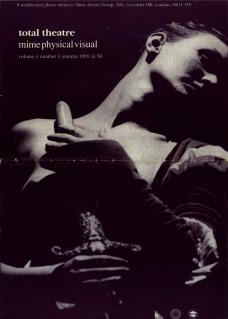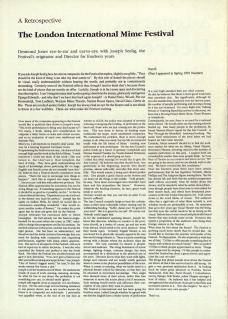If you ask Joseph Seelig how he selects companies for the Festival he replies, slightly too glibly, ‘They should be the kind of thing I can take my deaf auntie to.’ By this rule of thumb the pieces should be visual, easily understandable without hearing the words, and probably not too contentiously demanding. Certainly most of the Festival reflects that, though I tend to think that's because those are the kind of pieces that are mostly on offer. Luckily, Joseph is in fact more open and discerning than that implies. I can't imagine many deaf aunties going a bomb on the seamy, gloriously outrageous Django Edwards – and why don't we have him back again Joseph? – or Daniel Stein, Wissel, Pat van Hemmelrijk, Tom Leabhart, Warsaw Mime Theatre, Station House Opera, David Glass, Gerbe de Ble. These are not deaf-auntie fodder. Joseph has always had an eye for the bizarre and is not afraid to throw in a few wobblies. These are what make the Festival exciting.
How many of the companies appearing in the Festival would like to publicise their shows in Joseph's terms, ‘This is the performance to bring your deaf auntie to’? Not many, I think, taking into consideration (to vulgarise a little) bums on seats and critical success, and as an evaluation of one's own intellectual and dramatic flair.
Mind you, it all depends on Joseph's deaf auntie. She may be a hearing impaired Germaine Greer.
Programming the Festival is not easy. He does not find enough high-quality work in the field of Mime. ‘I wish tomorrow I could see more of the work I like and believe in. But I don't see it. More Complicité, that kind of thing. They have great understanding and depth of knowledge about portraying life on stage, English and French actors do not normally have this.’ He believes that a Festival should commission more pieces. ‘That's the way to encourage new things to happen.’ He'd like to expand into larger theatres, ‘...but you can't risk that with unknown products. The Festival offers opportunities for innovation, but not for trying things out. If something appears in the Festival it should be as good as it possibly can be.’ In this he echoes Marcel Marceau, ‘Experiment you do at school, in the theatre you must be perfect.’ Joseph has his sights on Sadler’s Wells, for which he would like to commission something wonderful ‘...that would require another realm of finance.’ He makes the point again that he does not grow rich on the Festival.
Joseph reiterates his enormous debt to Helen Lannaghan. He had already run the Festival single-handed for ten years when she came, in 1987, ostensibly to design the programme and be his assistant. He needed someone at that point, and she was exactly the right person. She has been an administrator, and therefore had the inside technical knowledge that you need for dealing with companies and organising performances, together with sharp artistic appreciation. She sat in on all aspects of the Festival, and soon had an equal say in artistic decisions. It was she who expanded the Festival and pushed it into the South Bank. She lifted the Festival into another bracket and gave it new directions. ‘You can't give a festival year after year without taking new approaches,’ says Joseph. ‘One of Helen's biggest assets,’ he says, ‘is that she works twenty-five hours a day.’
Joseph is on the business end of Mime. He markets the results of years of work, training, maturing, devising. So what he has to say about the profession is not something you can, or should easily ignore.
Joseph still regards circus as separate. It is not theatre, he says. He has seen huge and increasing resistance to one-person shows; just as any teacher knows the future is in companies not individuals. I personally was appalled when, at the end of my last stint as Adviser to ACGB, the policy was adopted of severely reducing or stopping the funding of performers at the hard end, those who are just coming into the profession. This was done in favour of funding more realistically the larger, more established companies. We understand the problem, there is never enough money to do what you need, but my life is concerned totally with the life blood of Mime – training new performers in new techniques. Yet the Arts Council's policy holds up a future of geriatric Complicités and Zimmer-Framed Trestles (or Trestle-framed Zimmers), at the expense of a developing artform.
I asked him what message he would like to give the Arts Council. He believes that they should fund, very generously at the beginning, anyone who shows promise, almost willy-nilly, and after that more carefully. This would ensure a living and vibrant profession. Give people a good chance at the bottom and cut down on the things in the middle. ‘Odd people,’ he says, ‘have been encouraged who shouldn't have been and this jeopardises the future.’ However, whatever the funding situation, he says, good work tends to survive.
Decroux would say that you can't be an artist if you haven't suffered.
The Arts Council certainly helps to beat the unfortunates at their most vulnerable (when starting out) by withholding funding. ‘Suffer, damn you! It's good for your soul.’ But is it good for our art? Of course not. Nobody could argue that.
As for the established speaking theatre, Joseph believes that directors, whether in London or the provinces, should, as a matter of course, go and see work from abroad, which tends to be more physical. Keep their minds open. Certainly English theatre is not renowned for its physically dynamic appeal in the way that much foreign theatre is. There is surely something wrong with a theatre where the audience claps the scenery. The only essential for theatre is people. Actors and audience. The rising dominance of scenic design, lighting design, costume design, has been accompanied by a diminution in the physical use of the actor. Directors know what they want with lights, design and costume and are mostly totally ignorant when it comes to the physical possibilities of the actor. When it comes to training, what we badly need is a physical theatre school for directors, so that they can be educated in movement knowledge. They might then demand more of their actors, rather than hire someone to move the actors about a bit if necessary. Such training would enrich and influence their conception of any piece they want to present.
The Festival is international and has been going for fourteen years. I asked Joseph whether he agreed with me that the English have a wider variety of performers of a very high standard than any other country.
He did; he believes that there is more good work here than anywhere else. But significantly, although he says the standard has improved over the last ten years, the number of people performing and earning a living by it has not increased. For every Right Size, Talking Pictures or Tottering Biped that arrives on the scene, we have lost a Moving Picture Mime Show, Three Women, or Intriplicate.
Consequently, he says, there is no need for a national mime school. He would rather see the existing schools beefed up. Like many people in the profession, he found Naseem Khan's report for the Arts Council – ‘A Way Through the Mimefield’ – backward looking. The name itself reminiscent of the tired jokes we had hoped we had come beyond.
Certainly, future research should try to link the audience market for what we do (Mime, Visual Theatre, Movement Theatre, et boring cetera) to the number of aspirant performers in this area. I suspect both are considerably smaller than most people think. As Yves Marc of Théâtre du Mouvement said about our art, ‘We are going to the moon, and we are already well on the way. We have covered the first centimetre.’
Over the fourteen years there have been certain performances that he has regretted, Termiek, Marita Phillips and The Adaptors figure among them. But he has always felt and feels that the printed programme itself reflects accurately what he thinks about the shows, and he stands by what he writes about them – even though people have from time to time asked for their money back, and others have threatened prosecution under the Trades Description Act. It all comes down to the word Mime, of course. The audience often has a rigid idea of what Mime actually is, and whether words are permissible or not. He maintains that up to five years ago Visual Theatre was the thing. but that now the verbal needs to be as strong as the visual. Before then it was a visual and physically based theatre that may include some words. However, this upsets a proportion of the audience who bring their foreign visitors to the Festival.
What does he feel about the future? The Festival is growing much more slowly than he would like. He would like to increase the quantity and quality of the Festival. No big surprise. He also expresses a wish that we all feel: ‘I'd like to offer people something they're happy with without too much hassle.’ Who wouldn't? ‘I'd like to think people appreciated us more. Things aren't improved by sniping. I'd like people to understand the Festival has done a great service and appreciate the care we take.’
The things that please Joseph most about the Festival are above all that it has survived and is still strong. He gets a very personal satisfaction from it. In looking back he takes great pleasure in Polivka, Hector Malamund, Nola Rae, Farid Chopel, I Colombaioni, Lecoq, Django, Bob Beaky, Julian Chagrin amongst a host of others. He believes that it has helped and strengthened the small body of people in the field, and increased interest in it. ‘Into the bargain,’ he says, ‘I have met some very nice people.’
That's us.

